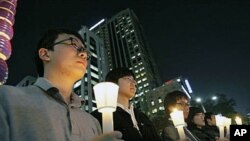Asia analysts say North Korea's recent revelations of new nuclear capabilities and its shelling Tuesday of a South Korean island are part of an effort to press the international community to give into concessions in talks on its nuclear program. They also say the developments are connected to the succession of Kim Jong Un - son of North Korea's ailing leader Kim Jong Il.
North Korea has once again thrust itself into the international spotlight. In less than a week, it has revealed to the world a new nuclear facility that stunned scientists by how advanced it was and rained down a barrage of artillery on a South Korean border island - killing troops and wounding civilians.
Abe Denmark, director of the Asia program at the Center for a New American Security believes the events are connected. He said they are related both to the recently begun succession of Kim Jong Un, as well as to what he calls North Korea's efforts to blackmail the international community into accepting it as a nuclear weapons state.
"This is part of a very concerted effort on behalf of North Korea to demonstrate resolve, to demonstrate strength, but also to try to pressure the international community into coming back to talks and giving into concessions," said Denmark.
Kim Jong Un, who is about 27, was recently appointed as a four-star general, despite having no military experience.
Kim Jong Il assumed power when his father, Kim Il Sung, the founder of North Korea, died in 1994. However, he had two decades prior to that to develop his political skills and public reputation.
Experts say there are concerns about Kim Jong Un - his age and ability to rule. Denmark says North Korea's behavior could be aimed at putting aside those concerns and getting factions within the country's leadership to rally around the young Kim.
"There is some concern about the rashness of youth," said Denmark. "There is also concern, and it is not unique to North Korea, that during times of leadership transition in authoritarian regimes - aggressive use of military foreign policy can be a way of unifying disparate factions within the leadership elite to rally to the cause."
Victor Cha, a former director of Asian Affairs at the White House during the Bush administration said one reason why the North has revealed so much information about its new nuclear facility is to bolster support for Kim Jung Un.
"[It is] all part of this broader narrative of establishing a new and strong state under this young leader, and a big, very important part of this is that about the only thing that Kim Jong Il has contributed to North Korea since he has been in power since 1994 is turning them into a nuclear weapons state," said Cha.
Nothing is certain, however, about the North Korean succession.
"We don't know what role Kim Jong Un is playing, but I think Kim Jong Il is still firmly in charge, and the provocations at the beginning of last year, as well as this year, are very reminiscent of North Korean negotiating behavior," said Bruce Klingner, a former chief of the CIA's Korea Branch, who is now a senior fellow at the Heritage Foundation.
North Korea broke off negotiations on ending its nuclear weapons program last year and carried out its second nuclear test shortly after that.
Klingner said one thing the succession is doing is making the continued stability of North Korea's regime more uncertain.
"Most experts, I think, agree that the single biggest factor for a successful succession is the continued life and viability of Kim Jong Il," he said. "The longer he lives, the more likely Kim Jong Un will build a sufficient support to maintain his seat in power."
He adds that if Kim Jong Il were to die tomorrow, there would be greater uncertainty about whether the rest of the leadership would support Kim Jong Un.




